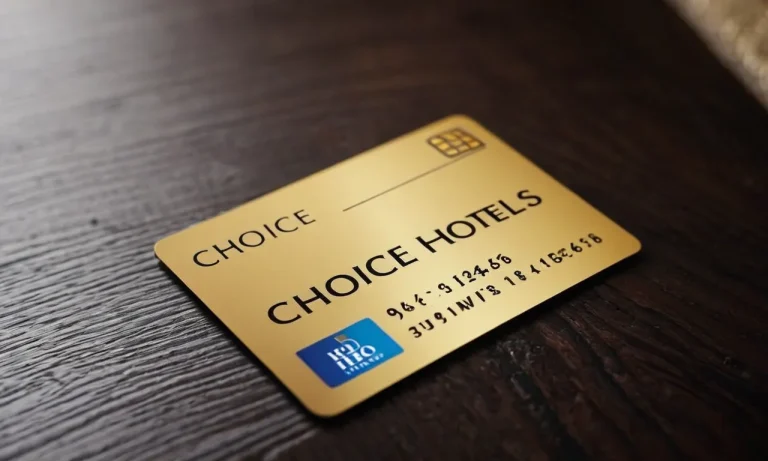Understanding Hotel Incidental Fees: A Comprehensive Guide
Imagine this: you’ve just checked into your dream hotel, ready to embark on a well-deserved vacation. But as you settle in, you’re hit with a slew of unexpected charges – resort fees, parking fees, and more.
These hidden costs, often referred to as ‘incidental fees,’ can quickly turn your dream getaway into a financial nightmare.
If you’re short on time, here’s a quick answer to your question: Hotel incidental fees are additional charges imposed by hotels for various services and amenities beyond the standard room rate. These fees can cover a wide range of items, from resort amenities and parking to internet access and in-room refrigerators.
In this comprehensive guide, we’ll dive deep into the world of hotel incidental fees, exploring what they are, why they exist, and how you can navigate them like a pro. We’ll cover everything from common types of fees to strategies for avoiding or minimizing these charges, ensuring you can enjoy your vacation without any unpleasant financial surprises.
What are Hotel Incidental Fees?
Hotel incidental fees, often referred to as resort fees or amenity fees, are additional charges imposed by hotels and resorts beyond the standard room rate. These fees can cover a wide range of services, amenities, and extras that guests may or may not use during their stay.
Understanding incidental fees is crucial for travelers to avoid unexpected costs and budgeting surprises. 😮
Definition and Overview
Incidental fees are charges added to a hotel bill for various services and amenities provided by the property. These fees are separate from the base room rate and can vary significantly from one hotel to another.
While some hotels are upfront about these charges, others may not disclose them clearly until the final bill is presented. According to a study by the American Hotel & Lodging Association, the average resort fee in the United States was $25.49 per night in 2021.
Common Types of Incidental Fees
-
Resort Fees
Resort fees are common in vacation destinations and can cover amenities like pool access, fitness centers, beach services, and recreational activities. These fees are often mandatory, regardless of whether guests use the amenities or not.
According to the Federal Trade Commission, resort fees should be disclosed upfront and included in the advertised room rate.
-
Parking Fees
Many hotels, especially in urban areas, charge for parking, either in a garage or a lot. These fees can range from a few dollars to over $50 per night, depending on the location and amenities offered. 🚗 Some hotels may offer discounted or complimentary parking for guests, so it’s essential to inquire about these fees in advance.
-
Internet and Wi-Fi Charges
While many hotels offer complimentary Wi-Fi, some still charge for internet access, especially for higher-speed connections. These fees can range from a few dollars per day to over $20 for premium internet packages.
💻 Travelers who need reliable internet access for work or entertainment should check if these fees apply and factor them into their budget.
-
Amenity Fees
Amenity fees can cover a variety of services and facilities, such as fitness centers, business centers, in-room bottled water, or newspaper delivery. These fees are often mandatory and can add a significant amount to the total cost of a hotel stay.
💰 It’s essential to review the hotel’s policies and fee breakdowns to understand what is included in the amenity fee.
To avoid surprises and make informed decisions, travelers should carefully review the hotel’s policies, read the fine print, and ask about any additional fees before booking. By understanding incidental fees, you can better budget for your trip and enjoy your hotel stay without unexpected costs. 👍
Why Do Hotels Charge Incidental Fees?
Incidental fees, also known as resort fees or amenity fees, have become a common practice in the hotel industry. These additional charges can often catch guests off guard, leading to frustration and confusion.
However, hotels have several reasons for implementing these fees, which we’ll explore in this section.
Revenue Generation
One of the primary reasons hotels charge incidental fees is to boost their revenue streams. The hospitality industry is highly competitive, and hotels are constantly seeking ways to increase their profitability.
By implementing incidental fees, hotels can generate additional income on top of room rates. According to a report by NBC News, resort fees can add an average of $25 to $35 per night to a hotel stay, translating to millions of dollars in additional revenue for large hotel chains.
Cost Recovery
Hotels often justify incidental fees as a way to cover the costs of providing various amenities and services to guests. These fees may include charges for Wi-Fi access, fitness center usage, pool maintenance, shuttle services, and more.
By separating these costs from the room rate, hotels can offer a seemingly lower base price while still recovering the expenses associated with these additional offerings. According to a survey by the American Hotel & Lodging Association, 88% of hotels charge incidental fees to offset the costs of providing amenities and services.
Competitive Advantage
In a highly competitive market, hotels may use incidental fees as a strategy to gain an edge over their competitors. By bundling certain amenities or services into a mandatory fee, hotels can advertise lower room rates while still generating additional revenue.
This approach can make their offerings appear more attractive to budget-conscious travelers who may overlook the added fees during the booking process. However, this practice has faced criticism from consumer advocacy groups for its lack of transparency, leading to calls for better disclosure and regulation.
Transparency and Disclosure Issues
One of the major concerns surrounding incidental fees is the lack of transparency and proper disclosure. Many travelers have reported feeling misled or surprised by these additional charges, which can significantly increase the overall cost of their stay.
While some hotels disclose these fees upfront, others may bury them in the fine print or fail to mention them altogether until checkout.
To address these concerns, organizations like the Federal Trade Commission (FTC) and consumer advocacy groups have advocated for clearer disclosure practices. The FTC’s website provides guidance on resort fees and encourages hotels to prominently disclose these charges upfront, allowing consumers to make informed decisions.
😊 Despite these efforts, transparency and disclosure issues remain a contentious topic in the hotel industry.
Navigating Hotel Incidental Fees
When booking a hotel stay, the advertised room rate often doesn’t tell the whole story. Incidental fees, also known as resort fees or amenity fees, can add a significant amount to your final bill. These charges cover various services and amenities, ranging from Wi-Fi access to gym facilities and parking.
Navigating these fees can be a daunting task, but with a little knowledge and preparation, you can make informed decisions and potentially save money.
Research and Compare Hotels
Before booking a hotel, it’s crucial to research and compare the incidental fees charged by different properties. Many reputable travel websites, such as TripAdvisor and Kayak, provide detailed information on these fees, allowing you to make an informed decision.
Additionally, hotels are now required to disclose these fees upfront, thanks to recent regulations by the Federal Trade Commission (FTC). By comparing fees across different hotels, you can find the most cost-effective option for your stay.
Negotiate and Ask for Waivers
Don’t be afraid to negotiate or ask for waivers on incidental fees. Many hotels are willing to waive or reduce these charges, especially for loyal customers or those booking extended stays. According to a survey by SmarterTravel, approximately 83% of travelers who asked for a waiver were successful.
It never hurts to politely inquire about any potential discounts or waivers during the booking process or upon check-in.
Join Loyalty Programs
Joining a hotel’s loyalty program can often lead to incidental fee waivers or discounts. Major hotel chains, such as Marriott, Hilton, and Hyatt, offer various perks and benefits to their loyalty members, including free Wi-Fi, discounted parking, and complimentary amenities.
According to a study by USA Today, loyalty program members can save an average of $20 per night on incidental fees. 😊 Additionally, achieving higher tiers within these programs can unlock even more valuable benefits.
Consider Alternative Accommodations
If hotel incidental fees are a significant concern, consider exploring alternative accommodations like vacation rentals or Airbnb. These options often provide more inclusive pricing and can be a cost-effective solution, especially for longer stays or larger groups.
However, it’s essential to thoroughly research the property and read reviews to ensure you’re getting a reputable and comfortable accommodation. 👍
By being an informed and proactive traveler, you can navigate the world of hotel incidental fees with confidence. Remember, a little research and negotiation can go a long way in saving you money and ensuring a stress-free and enjoyable stay. 🎉
Legal and Regulatory Considerations
When it comes to hotel incidental fees, there are several legal and regulatory considerations that both hotels and consumers need to be aware of. These considerations aim to protect consumer rights and ensure transparency in the hospitality industry.
Consumer Protection Laws
Consumer protection laws play a crucial role in regulating hotel incidental fees. These laws vary across different jurisdictions, but their primary objective is to safeguard consumers from unfair or deceptive practices.
For instance, the Federal Trade Commission (FTC) in the United States has specific guidelines for hotels regarding disclosure of fees and surcharges. Hotels must clearly disclose all mandatory fees, including resort fees, parking fees, and internet access fees, to avoid misleading consumers.
According to a recent report by Bjorn Hanson, the average resort fee in the United States reached a record high of $34 per night in 2022, a staggering 92% increase from the pre-pandemic level of $17.70 in 2019.
These statistics highlight the importance of consumer protection laws in ensuring transparency and fairness.
Disclosure Requirements
Closely tied to consumer protection laws are disclosure requirements for hotels. Many jurisdictions mandate that hotels clearly disclose all incidental fees upfront, before guests make a reservation. This information should be readily available on the hotel’s website, booking platforms, and during the reservation process.
Failure to disclose fees adequately can result in fines, legal action, and damage to the hotel’s reputation.
The American Hotel & Lodging Association (AHLA) has implemented a Code of Ethics for the Travel Industry, which includes guidelines for fee transparency. Hotels that adhere to this code are committed to providing clear and comprehensive information about all fees and surcharges to guests.
Industry Initiatives and Self-Regulation
While legal and regulatory frameworks are essential, the hospitality industry itself has taken steps to promote transparency and fair practices regarding incidental fees. Many hotel chains and industry associations have adopted self-regulatory measures and best practices to build trust with consumers and maintain a positive reputation.
For example, Marriott International has implemented a policy to clearly disclose all mandatory resort fees and other incidental charges during the booking process. Additionally, organizations like the World Travel & Tourism Council (WTTC) have advocated for greater transparency and consumer protection measures within the industry.
By adhering to these industry initiatives and self-regulatory measures, hotels can demonstrate their commitment to ethical practices and build long-term relationships with their guests.
Tips for Avoiding or Minimizing Incidental Fees
Book Directly with the Hotel
One of the best ways to avoid or minimize incidental fees is to book your hotel stay directly through the hotel’s official website or by contacting them directly. By doing so, you can often bypass third-party booking sites that may tack on additional fees.
Many hotels offer exclusive deals and discounts to guests who book directly with them, which can help offset any potential incidental fees. Additionally, booking directly allows you to communicate any special requests or preferences upfront, reducing the likelihood of incurring unexpected charges.
Opt for Inclusive Packages
Consider booking an inclusive package that bundles your room rate with other amenities or services. All-inclusive resorts, for example, typically include meals, beverages, and activities in the upfront cost, eliminating the need for incidental fees.
Similarly, some hotels offer packages that include parking, Wi-Fi, or access to on-site facilities like gyms or spas. By opting for these packages, you can enjoy added value while avoiding à la carte charges.
Utilize Travel Rewards and Discounts
If you’re a member of a hotel loyalty program or have travel rewards credit cards, be sure to take advantage of any perks or discounts they offer. Many loyalty programs provide complimentary amenities like free Wi-Fi, room upgrades, or waived resort fees for their members.
Similarly, some credit cards offer statement credits or reimbursements for incidental fees charged by hotels. Websites like NerdWallet and CreditCards.com can help you compare travel rewards programs and find the best deals.
Be Mindful of Your Usage
While incidental fees can sometimes be unavoidable, being mindful of your usage can help minimize the charges you incur. For instance, if your hotel charges for in-room Wi-Fi, consider using your mobile data plan or finding a nearby café with free Wi-Fi.
If there’s a fee for using the in-room safe, keep your valuables with you or use the hotel’s secure storage facilities. Additionally, be aware of any charges for amenities like in-room movies, minibar items, or room service, and avoid using them unless necessary.
According to a survey by Forbes, nearly 60% of travelers have encountered unexpected incidental fees during their hotel stays. By following these tips, you can take control of your travel expenses and enjoy a more budget-friendly and stress-free hotel experience.
Don’t let hidden fees ruin your vacation – knowledge is power when it comes to avoiding or minimizing incidental charges! 😎
Conclusion
As you can see, hotel incidental fees are a complex and often contentious issue in the hospitality industry. While these fees can add significant costs to your stay, understanding what they are and why they exist can help you make informed decisions and navigate them more effectively.
By following the strategies outlined in this guide, such as researching and comparing hotels, negotiating fees, joining loyalty programs, and considering alternative accommodations, you can minimize the impact of incidental fees on your travel budget.
Additionally, being mindful of industry regulations and consumer protection laws can empower you to make informed choices and advocate for greater transparency.
Ultimately, the key to avoiding unpleasant surprises lies in being an informed and proactive traveler. By arming yourself with knowledge and employing the tips and strategies discussed in this guide, you can enjoy your hotel stay without the added stress of unexpected charges, allowing you to focus on creating unforgettable memories.







